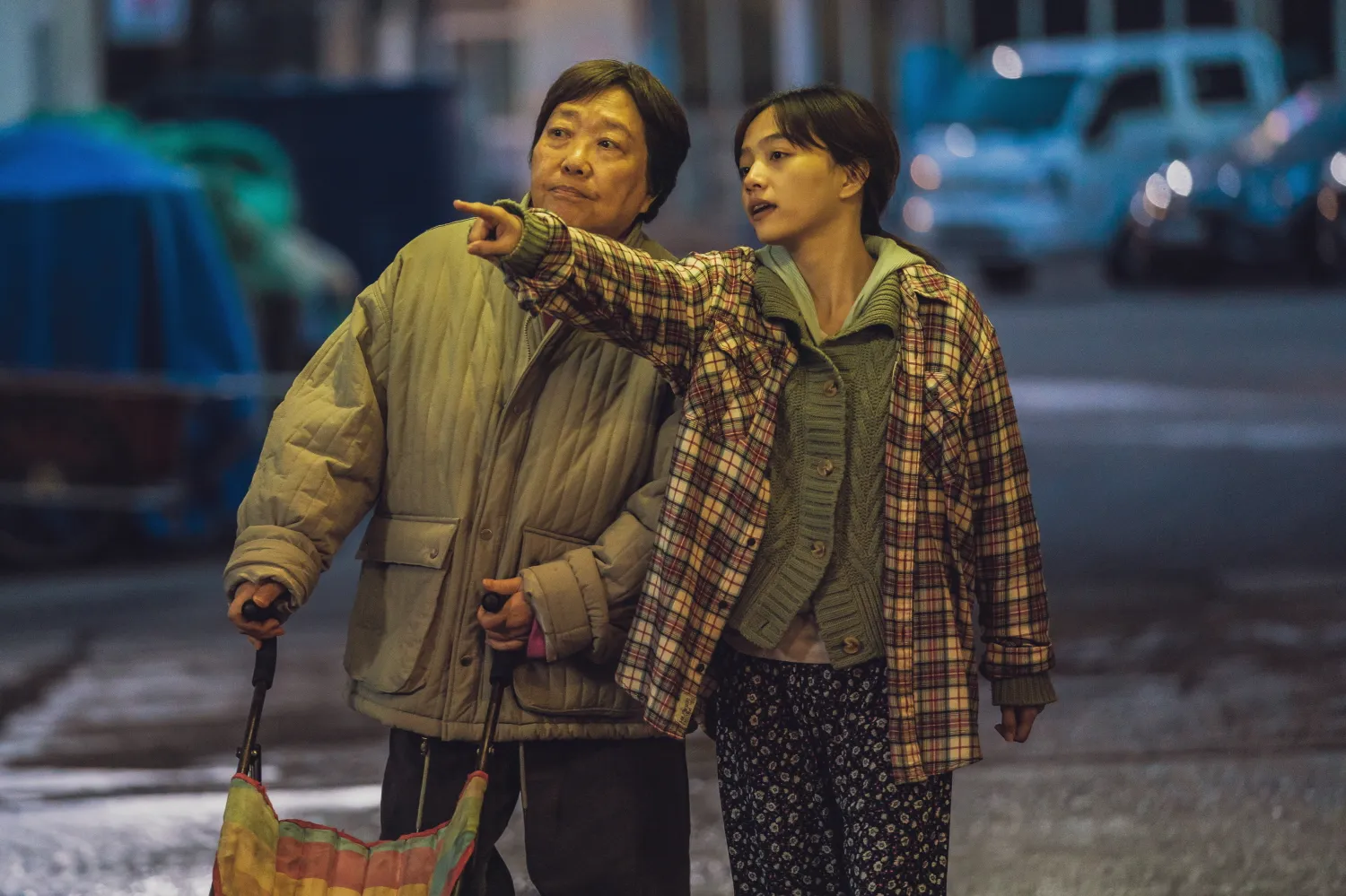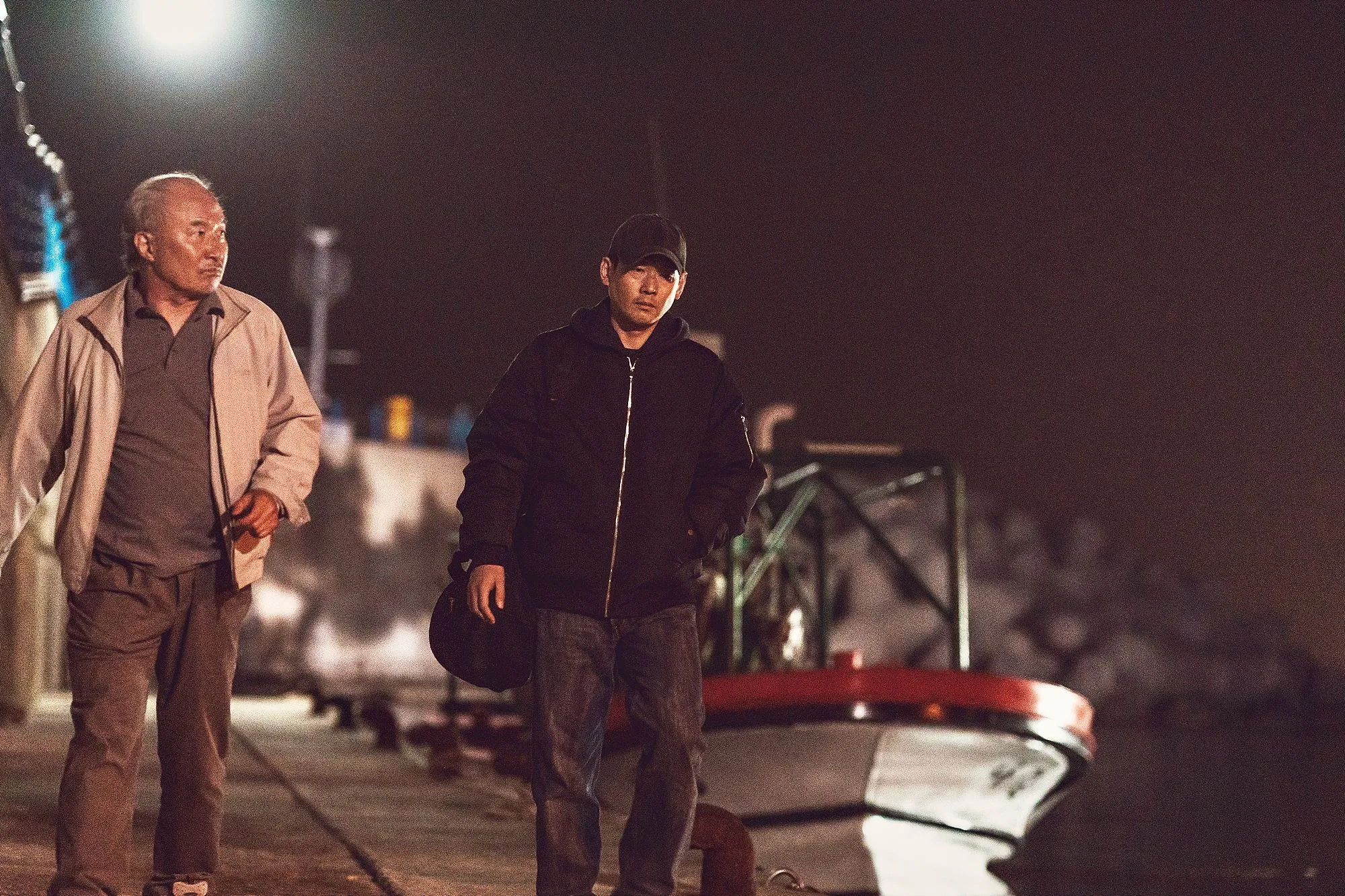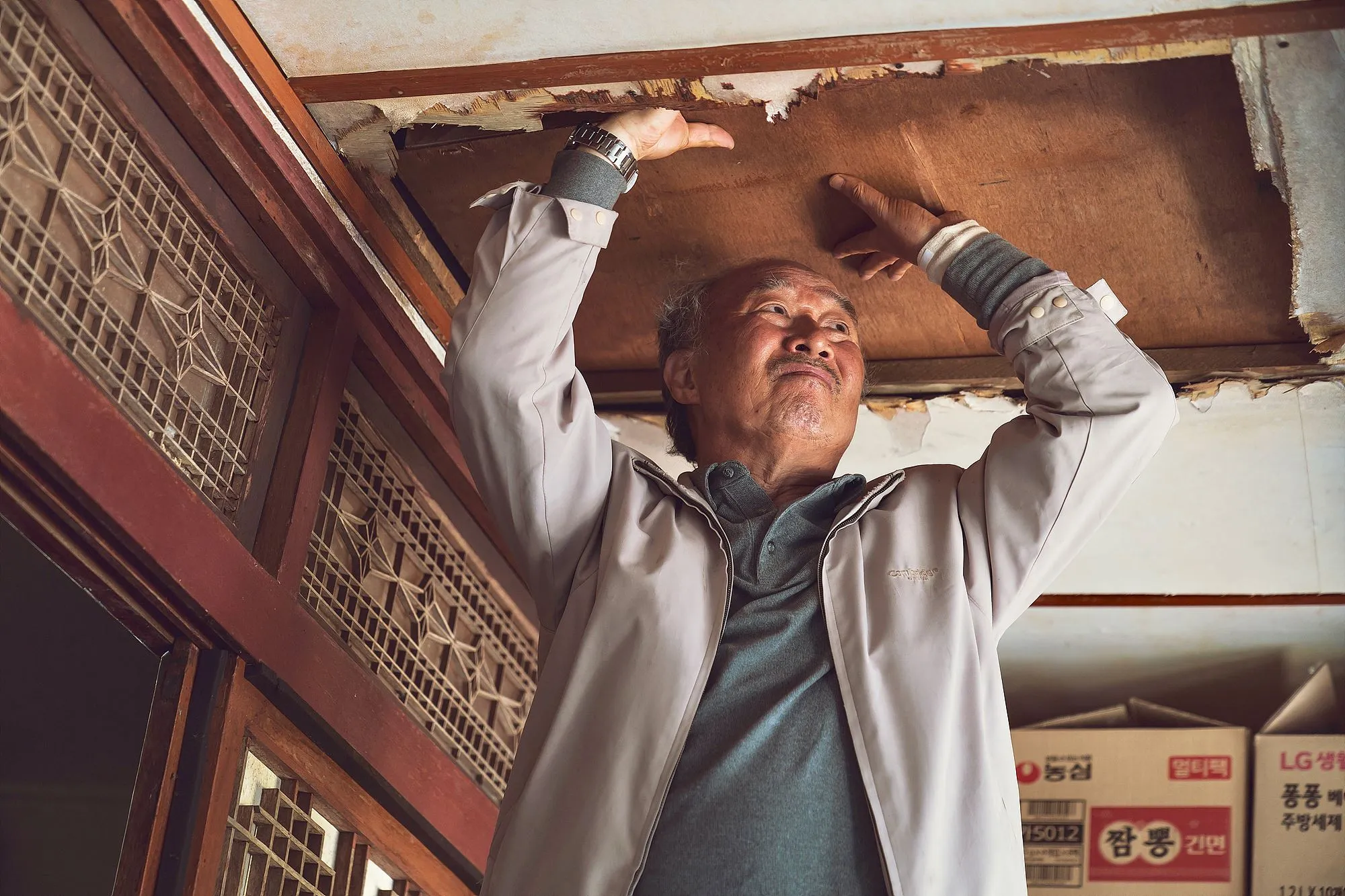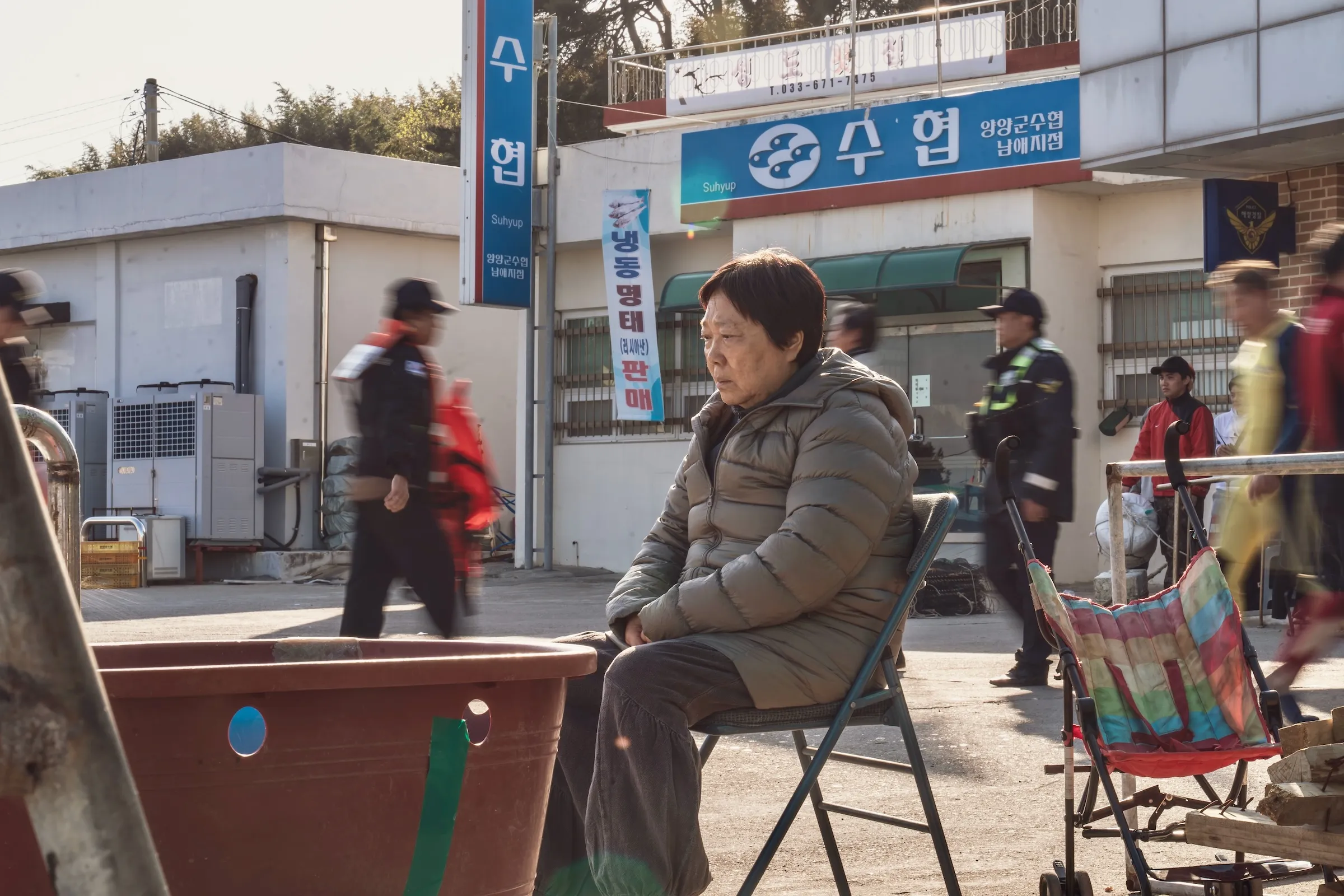In “The Land of Morning Calm,” Park Ri-wrong transports viewers to a small seaside town where the air is thick with salt and social scrutiny. The setting—a seemingly lovely village—serves as both backdrop and character, expressing the inhabitants’ narrow-mindedness.
At the heart of the story is the disappearance of Yong-su (Park Jong-hwan), whose absence causes fear across the community. The captain, Yeong-guk (Yoon Joo-sang), is motivated by his demons and devises a plan that turns a simple fishing excursion into a web of lies. As the story progresses, the audience becomes implicated, feeling the strain of the hurried search while the captain struggles with his guilt and societal expectations.
Yong-su’s absence tremendously impacts his mother and pregnant wife, Yeong-ran (Khazsak), demonstrating how societal norms can transform into collective punishment. The town’s biases, notably toward strangers, reflect historical conflicts, reminding us that such feelings are frequently deeply ingrained.
Finally, “The Land of Morning Calm” is more than just a story about a missing individual; it delves into the links that bind and the chains that entangle, reflecting on the truths we hide beneath the waves of complacency.
The Weight of the Anchor: A Deep Dive into Character Dynamics in “The Land of Morning Calm”
Captain Yeong-guk (Yoon Joo-sang) is a character full of contradictions—an elderly fisherman whose crusty demeanor conceals a complex inner life. He is the archetype of the jaded, bitter man, but his path shows depths of vulnerability and regret. Yeong-guk oscillates between harsh pragmatism and unexpected sensitivity due to his predisposition for self-destructive conduct (a few too many bottles of soju, anyone?).
He serves as a microcosm of his internal struggle through his connection with Yong-su (Park Jong-hwan). Initially, he is a reluctant mentor, extending a lifeline to a younger man whose failures match his own. However, as the story progresses, we see how their friendship, which was formed through shared hardships, is ultimately defined by treachery.
Yong-su’s plan to disappear emphasizes Yeong-guk’s existential quandaries. While assisting in the deception, he gets caught up in guilt and the social web of their community. It’s a classic instance of “the devil you know”—the captain’s decision to join Yong-su’s scheme is as much about self-protection as it is about regaining a feeling of purpose. This relationship is rich with irony, as Yeong-guk’s desire to escape his demons only deepens his confinement.
Then there’s Yong-su’s family, whose problems provide another layer of societal commentary. His mother and Vietnamese bride, Yeong-ran, must navigate a hostile landscape of prejudice and despair. Their experiences reveal the village’s subtle biases, notably toward strangers.
This becomes brutally clear when rumors about Yeong-ran’s citizenship application spread, revealing how systematic racism manifests in everyday life. It’s a sobering reminder that in a community where everyone knows everyone’s business, the truth is frequently distorted to fit the narrative of social order.
While maybe less developed than the stars, the supporting characters serve as important conduits for the film’s commentary. They embody the village’s collective mentality, which is compassionate and ruthless. The community’s reaction to Yong-su’s abduction becomes a reflection of their prejudice and fear, converting them into characters who are simultaneously sympathetic and tragically flawed. This dichotomy begs whether we are defined by our activities or the views of others around us.
In “The Land of Morning Calm,” character interactions do more than propel the plot; they force us to confront painful truths about ourselves and our civilizations.
Tides of Prejudice and Isolation: Thematic Depths in “The Land of Morning Calm”
“The Land of Morning Calm” expertly navigates the murky waters of prejudice and social relations, revealing the often unpalatable facts lurking beneath the surface of community life. Racial and socioeconomic stereotypes are as widespread as the salty air in the seaside town of Nam-myeon, influencing interactions and generating suspicion.
Yeong-guk’s hostility against the Vietnamese, which echoes historical conflicts, demonstrates how deeply established biases can show in everyday life. His casual hatred for Yong-su’s wife, Yeong-ran, is more than simply personal; it symbolizes a societal community fear of the “other” that pervades the community’s collective consciousness.
This prejudice does more than just serve as a backdrop; it catalyzes character interactions, frequently revealing the fragility of human bonds. As the characters navigate this volatile environment, their relationships deteriorate, revealing how societal conventions may disrupt familial bonding. The rumors surrounding Yeong-ran’s citizenship application highlight a terrible reality: in close-knit societies, empathy is frequently overshadowed by fear and jealousy.
The film’s overarching subject of isolation and despair is equally captivating. While the town is small geographically, it feels enormous emotionally. Characters like Yeong-guk and Yong-su are dealing with their existential crises, feeling lost in a world that provides little relief.
Yeong-guk’s late-night soju sessions become a coping mechanism—a bittersweet admission of his failures and regrets. Similarly, Yong-su’s disappearance serves as both an escape and a source of intense concern for those who remain behind.
In this dismal landscape, the characters’ troubles reflect larger societal issues of hopelessness and alienation, calling into question the human condition. How do you navigate a world that feels increasingly isolating? What compromises are required in the pursuit of connection? In a world full of prejudice and despair, “The Land of Morning Calm” urges viewers to reflect on the complexities of belonging.
Visual Resonance: Cinematography and Direction in “The Land of Morning Calm”
In “The Land of Morning Calm,” the cinematography is a disturbing mirror to the film’s thematic core. Shot in the gentle, eerie light of dawn, the coastal landscapes alternate between calm beauty and menacing overtones, creating a visual duality that echoes the characters’ internal difficulties.
The camera lingers on the craggy shoreline and the abandoned fishing boats, capturing the town’s physical isolation and its residents’ emotional desolation. (Some could call it “landscape as character”—a familiar trope but performed via a new, introspective lens.)
The design choices are purposeful, with a muted color palette that reflects the sad tone. Shadows play an important part, engulfing characters in darkness that symbolizes their psychological difficulties. For example, the contrast between the brilliant colors of the sea and the grays of the town emphasizes the characters’ need for escape in the face of their harsh realities. This visual storytelling adds to the film’s examination of prejudice and despair, making the audience intensely aware of the beauty and brutality of life in Nam-myeon.
Park Ri-woong’s direction adds to the film’s emotional weight. His pacing is brilliant, gently increasing suspense as the story progresses. Moments of calm are interspersed by unexpected bursts of drama, reflecting the unpredictable character of life in this small town. (Imagine a symphony with the calm notes as striking as the crescendos.) The director’s ability to generate a genuine sense of dread without resorting to overt dramatization encourages viewers to consider the characters’ moral difficulties.
Furthermore, Park uses extended takes to let the weight of quiet settle, resulting in an atmosphere conducive to reflection. This decision can be unsettling, but it forces the audience to connect profoundly with the characters’ emotional landscapes. In a world where quick cuts and fast pacing are frequently used, Park’s methodical approach is pleasantly introspective, enabling viewers to linger on the complexities of human relationships and societal challenges.
Finally, “The Land of Morning Calm” is a visual and narrative tapestry woven with themes of isolation, prejudice, and the never-ending desire for belonging. The film’s artistic choices and directorial expertise complement one another, resulting in a moving investigation of humanity.
Depths of Emotion: Performance Highlights in “The Land of Morning Calm”
Yoon Joo-sang’s performance as Captain Yeong-guk is a masterclass in nuanced acting. His acting conveys the complexities of a man lost in a sea of regret and bitterness. Yoon portrays a character who is both relatable and flawed with every phrase she says and every silence she holds.
His tough demeanor is a protective shell, slowly cracking to reveal the tragic vulnerabilities beneath. We witness glimpses of his rage and contempt and moments of unexpected tenderness—a duality that keeps the audience wondering. (Is he a tragic hero or just a curmudgeon? Perhaps a little of both?
How Yoon navigates Yeong-guk’s emotional landscape has a tremendous impact on our perception. His ability to portray a lifetime of fatigue with a glance or sigh speaks volumes. Despite his morally problematic actions, the audience is driven to identify with him. Yoon’s skill is demonstrated by the fact that we are split between fury and understanding, swept up in the currents of his character’s moral uncertainty.
The supporting cast nicely enhances Yoon’s star performance. Yang Hee-kyung, who plays Yong-su’s mother, performs moving as a lady who clings to hope in the face of despair. Her intense love starkly contrasts the bitterness surrounding her, making her struggle all the more painful. Meanwhile, Khazsak’s performance as Yeong-ran is a genuine and deep portrayal of a woman stuck between cultural prejudice and personal sorrow.
The ensemble dynamics create tension, with each character contributing richness to the narrative tapestry. Characters like the local fishermen and villagers, while frequently serving as vehicles for societal commentary, also bring their personal experiences to the forefront. Their interactions with Yeong-guk and Yong-su highlight the complexities of community life, reinforcing the film’s examination of collective guilt and prejudice.
In “The Land of Morning Calm,” the performances are more than just decorations; they constitute the substance of the film’s emotional and thematic weight. Each performer adds to a collective narrative that resonates on both personal and societal levels, making the film a profound investigation of mankind’s flaws.
Tides of Change: Cultural Context in “The Land of Morning Calm”
“The Land of Morning Calm” serves as a cutting social commentary on contemporary South Korean society, showing deep-seated prejudice and socioeconomic inequality. The film’s depiction of Nam-myeon, a small coastal town, serves as a microcosm of the larger societal landscape, in which xenophobia and traditional values collide with the complexities of modern life.
Historically, South Korea has struggled with attitudes toward foreigners, especially in light of rising globalization and immigration. This film sheds light on many people’s persistent unease toward the “other,” notably the Vietnamese community, evoking a dark period in South Korea’s postwar history when economic struggles formed national identities.
The characters’ interactions highlight the insidious nature of prejudice, which frequently festers under the surface, fueled by a toxic combination of ignorance and fear. Yeong-guk’s dislike for Yeong-ran is not purely personal; it reflects a societal reluctance to welcome variety. This story thread draws on the historical setting of South Korea’s fast industrialization and the resulting social structures, in which the “newcomer” is frequently regarded with distrust.
Nonetheless, the film appeals to modern audiences by addressing universal themes of isolation and the search for belonging. In a world increasingly separated by borders and identities, Yeong-su’s family’s challenges represent deeper human experiences such as love, loss, and the need for acceptance.
In the landscape of South Korean cinema, “The Land of Morning Calm” stands out for its moving storytelling and willingness to address hard truths. It encourages viewers to reflect on their biases and the societal institutions supporting them. As such, it is important in the ongoing discussion about race, identity, and community in a rapidly changing world.
The Review
The Land of Morning Calm
"The Land of Morning Calm" is a somber investigation of prejudice and isolation, expertly brought to life by Yoon Joo-sang's subtle performance and Park Ri-woong's thoughtful direction. The film's visual storytelling and deep character relationships are a sad reflection of modern South Korean culture, making it both a gripping narrative and an important cultural critique. Its ability to elicit reflection on interpersonal connections in the face of societal biases makes it relevant in today's cinematic landscape.
PROS
- Yoon Joo-sang delivers a standout performance that captures emotional depth.
- The cinematography beautifully reflects the film's themes of isolation and prejudice.
- Engages with important social issues, such as xenophobia and community dynamics.
- Complex characters create a relatable and engaging narrative.
- Offers a critical look at contemporary South Korean society.
CONS
- Some may find the slow pacing challenging, particularly in moments of introspection.
- The film's focus on bleak subject matter may be off-putting for some viewers seeking lighter fare.
- The narrative relies heavily on dialogue and emotional exploration rather than plot-driven events.





















































